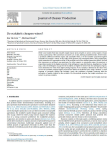Lim K.H., Reed M. (2020). Do ecolabels cheapen wines? Journal of Cleaner Production, 01/02/2020, vol. 245, p. 1-10.
https://doi.org/10.1016/j.jclepro.2019.118696
https://doi.org/10.1016/j.jclepro.2019.118696
| Titre : | Do ecolabels cheapen wines? (2020) |
| Auteurs : | K.H. Lim ; M. Reed |
| Type de document : | Article |
| Dans : | Journal of Cleaner Production (vol. 245, February 2020) |
| Article en page(s) : | p. 1-10 |
| Langues : | Anglais |
| Langues du résumé : | Anglais |
| Catégories : |
Catégories principales 10 - INDUSTRIES ; 10.9 - VinThésaurus IAMM ECOLABEL ; VIN ; ALIMENT BIOLOGIQUE POUR HOMME ; APPELLATION D'ORIGINE ; VAOC ; PRIX ; COMPORTEMENT DU CONSOMMATEUR ; PREFERENCE ALIMENTAIRE ; CONSENTEMENT A PAYER ; COOPERATIVE VITIVINICOLE |
| Résumé : | While some studies find that ecolabels might impose price penalties to wines, several aspects remain unclear; particularly, if the mainstream consumers are, in fact, disliking ecolabeled wines; if there exists a systematic difference between organic and sustainable wines; or if the ecolabels’ purported negative correlation to prestige is robust. In this study, these questions are investigated with a choice experiment, which estimates the consumption utility of the ecolabels and of the relevant interaction effects. We find that consumers are willing to pay premiums for either organic or sustainable wines; the premium is especially prevalent in the higher percentile of the willingness to pay distributions. Appellations of origin play a role; the willingness to pays for the ecolabels are higher for wines from less-prestigious regions, but it diminishes for wines from higher-prestige regions. No eco-penalty is detected at the mean level, nor do the ecolabels penalize higher-priced wines within the examined price range. However, a small segment of consumer dislikes the ecolabels. Lastly, the preference correlates positively with the perception of quality implied by the ecolabels. We recommend wineries that target mainstream consumers to pursue ecolabels. |
| Cote : | Réservé lecteur CIHEAM |
| URL / DOI : | https://doi.org/10.1016/j.jclepro.2019.118696 |







